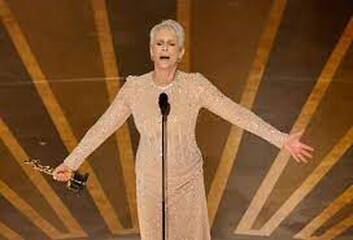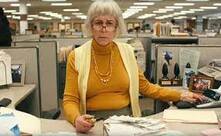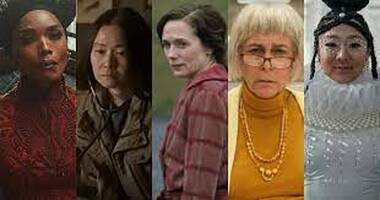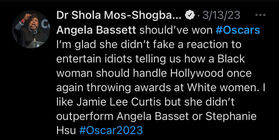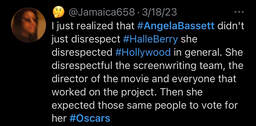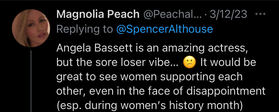"After 46 years of acting, Jamie Lee Curtis finally won an Oscar. But did she deserve it?" --Reeghan Walsh, 8th Grade
Like every year, the Oscars was a whirlwind of an awards show. With tears, smiles, and drama, nearly everyone had an opinion on something. One of the biggest controversies from this year’s ceremony was “Did Jamie Lee Curtis deserve her Oscar for Best Supporting Actress?”
| Curtis has been acting for 46 years, first appearing in Operation Petticoat (a sitcom spanning from 1977-1978) as Lt. Barbara Duran. She starred in the Halloween films and acted in others like Freaky Friday and Knives Out. However, she won Best Supporting Actress for her character, Deridre Beaubedirdre, the Wang’s tax collector in 2022’s Everything Everywhere All At Once. | Curtis in Everything Everywhere All at Once. |
Everything Everywhere All at Once is about Evelyn Wang (Michelle Yeoh), a Chinese American immigrant, who must enter the multiverse to save it from collapsing at the hands of Jobu Tupaki, an alternate version of her daughter, Joy Wang (Stephanie Hsu).
Hsu was another contender for Best Supporting Actress, along with Angela Bassett (in Black Panther: Wakanda Forever), Hong Chau (in The Whale), and Kerry Condon (in The Banshees of Inishiren).
Hsu was another contender for Best Supporting Actress, along with Angela Bassett (in Black Panther: Wakanda Forever), Hong Chau (in The Whale), and Kerry Condon (in The Banshees of Inishiren).
Despite being in the same film, Hsu and Curtis’s roles are vastly different. According to Goldderby, Curtis has 17 minutes and 15 seconds (12.38% of the film) of screentime, while Hsu has 42 minutes and 18 seconds (30.36% of the film) of screentime. The characters they play offer different additions to the movie: Hsu’s bringing the conflict, but also showing a daughter’s relationship with her mother, while Curtis brings drama and some comedy.
“To me, a supporting character is somebody who isn’t the main character, obviously, but still has a lot of complexity,” Maya Catrina Mastropasqua, 8th grader at Oakland School for the Arts, said of Curtis’ performance. “I think that [with] Jamie Lee Curtis, I saw her role as more of like a fun little cameo.”
Out of all the actresses up for Best Supporting Actress, Curtis had the least amount of screentime in her film.
Additionally, many felt that Curtis’ performance in Everything Everywhere All at Once was not as good as the other actresses up for this award. “For this role, I thought she did a good job, but it isn't nearly her most memorable performance. I think she has done a much better job in other films, so I was surprised she took away the win,” Joe Steinbacher, viewer of the Oscars said, “On one hand, I think she deserves the accolades, but I wouldn't say this was the role to pick.”
Those who were rooting for Curtis this season brought up the point that she has done well in a lot of other films, and she hasn’t gotten recognition for them. Her work in Freaky Friday was iconic, as well as her starring roles in the Halloween films. The issue with this is that other nominees have also been acting for years, without proper recognition, Bassett being one of them. Viewer of the Oscars, Mike Walsh offered, “She’s been nominated twice and hasn’t won. Both of her performances were amazing. She was incredible in What’s Love Got To Do With It.”
Mastropasqua brought up, “The Oscars aren’t a lifetime achievement award. You’re winning for the work that you did on a certain project.”
“To me, a supporting character is somebody who isn’t the main character, obviously, but still has a lot of complexity,” Maya Catrina Mastropasqua, 8th grader at Oakland School for the Arts, said of Curtis’ performance. “I think that [with] Jamie Lee Curtis, I saw her role as more of like a fun little cameo.”
Out of all the actresses up for Best Supporting Actress, Curtis had the least amount of screentime in her film.
Additionally, many felt that Curtis’ performance in Everything Everywhere All at Once was not as good as the other actresses up for this award. “For this role, I thought she did a good job, but it isn't nearly her most memorable performance. I think she has done a much better job in other films, so I was surprised she took away the win,” Joe Steinbacher, viewer of the Oscars said, “On one hand, I think she deserves the accolades, but I wouldn't say this was the role to pick.”
Those who were rooting for Curtis this season brought up the point that she has done well in a lot of other films, and she hasn’t gotten recognition for them. Her work in Freaky Friday was iconic, as well as her starring roles in the Halloween films. The issue with this is that other nominees have also been acting for years, without proper recognition, Bassett being one of them. Viewer of the Oscars, Mike Walsh offered, “She’s been nominated twice and hasn’t won. Both of her performances were amazing. She was incredible in What’s Love Got To Do With It.”
Mastropasqua brought up, “The Oscars aren’t a lifetime achievement award. You’re winning for the work that you did on a certain project.”
| Hsu in Eveyrthing Everywhere All at Once | Another actress overlooked in this category was Hsu. “I think I was more enamored of Stephanie Hsu’s role after watching the entire movie. I’m not sure if that is because her character had a more central role, or whether her acting was better, but I was more drawn to her,” Walsh expressed when comparing the two actresses in Everything Everywhere All at Once up for Best Supporting Actress. |
“The first thing I thought about when Jamie Lee won, [was] that it’s this, Everything Everywhere All at Once, is a huge movie for Asian actors,” Mastropasqua remarked. “It is something that, you know, a white woman winning for this Asian movie.”
This begs the question, is there a possible quirk in the system? Could Curtis have won because of discrimination? The Oscars are infamously bad with their inclusivity, sparking the hashtag #OscarsSoWhite in 2015, created by Twitter activist April Reign.
This begs the question, is there a possible quirk in the system? Could Curtis have won because of discrimination? The Oscars are infamously bad with their inclusivity, sparking the hashtag #OscarsSoWhite in 2015, created by Twitter activist April Reign.
While they have shown an effort of improvement since then, the Oscars are still struggling with diversity in the Academy. This year was a big win for Asian representation, but many black films, actors, and directors were overlooked. Viola Davis was ignored for her role as General Nanisca in The Woman King, Danielle Deadwyler for her role as Mamie Till-Bradely in Till, Alice Diop for her directing of Saint Omer, and other instances. According to The Evening Standard, no black women were nominated for Best Actress. In fact, only two black actors were nominated this year, Bassett and Brian Tyree Henry (for Best Supporting Actor in Causeway). However, neither won. Many were upset over the loss of Bassett for Best Supporting Actress.
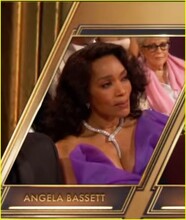
Steinbacher said, “I think she [Bassett] was excellent in Wakanda Forever, and I’m sure a lot of her performance was real, raw emotion due to the loss of Chadwick.” Steinbacher also added that Bassett’s reaction was a little sour. When the award was announced, Bassett didn’t clap, and offered a small sad smile. “I think she could have been a better sport about it, and at least stood and gave applause for the winner. If it had been the other way around, I’m positive Jamie Lee would have done that for her,” Steinbacher noted. Others had their own opinions.
“I imagine it must be incredibly disappointing not to win. She’s been nominated twice and hasn’t won,” Walsh sympathized. “It’s hard to be gracious in a moment like that. Historically, the Academy has not been very inclusive and people of color have often been overlooked.” Looking back at the Oscars throughout the years, this fact certainly makes itself known.
Only 22 black actors have won Academy Awards in the history of the Oscars. On top of that, only one black actress has ever won for Best Lead Actress. This was Halle Berry in Monster’s Ball. Nine black women have won for Best Supporting Actress.
People pointed these out when discussing Bassett’s reaction to her loss, bringing back #OscarsSoWhite.
Some heavily criticized Bassett’s reaction. One Twitter user stated, “Pretty unprofessional of her. I’m sure if she had won, Jamie would have yelled Angela’s name out of sheer joy. That is why it is said that there are two kinds of people.”
Others didn’t understand why people were upset over her reaction.
“People are entitled to have whatever reaction they feel. I think it’s weird to pressure people to have this certain reaction,” Mastropasqua spoke.
Jennifer Dahlman, a member of the Academy, voted for Curtis to win, but she did say of Bassett, “I thought hers [reaction] was a very human response.”
But if diversity really is the problem, how is it being fixed? Dahlman spoke on how she was added to the Academy, saying, “I was sponsored by two existing Academy members from the branch I qualified for, Short Films & Animation. They had to write letters of recommendation.” For Short Films & Animation, a specific number of screen credits were needed, with certain leadership titles. “The Board of Governors ultimately decide who will receive invitations. I became a member in 2017,” Dahlman added.
For Academy Award members, nominees are automatically considered, and don’t need sponsors to gain membership. This is why diversity in the actual awards is so important. The more diverse the Academy and the voting are, the more likely it is that there will be less racial biases and less politics to do with it. “The Oscars are very politically charged. Like, we’ve seen it before, Michelle Yeoh won [Best Lead Actress] and she was the second woman of color ever to win [Best Lead Actress] in 96 years,” Mastropasqua mentioned.
“Regardless of what mechanisms are in place, people will always bring their own biases to any voting process. It’s inherent to the selection system, whether you’re voting for president, yearbook superlatives, or Oscar winners,” Dahlman stated. “Where they [the Academy] are getting the most traction is increasing by diversity in the films that qualify, and diversity within the voting pool. There is still a long way to go, but progress is being made.” The Oscars voting process is explained here.
Whether or not Curtis deserved her Oscar is up to interpretation, but one thing is for sure, the Oscars need to get with the times, and be more inclusive.
“People are entitled to have whatever reaction they feel. I think it’s weird to pressure people to have this certain reaction,” Mastropasqua spoke.
Jennifer Dahlman, a member of the Academy, voted for Curtis to win, but she did say of Bassett, “I thought hers [reaction] was a very human response.”
But if diversity really is the problem, how is it being fixed? Dahlman spoke on how she was added to the Academy, saying, “I was sponsored by two existing Academy members from the branch I qualified for, Short Films & Animation. They had to write letters of recommendation.” For Short Films & Animation, a specific number of screen credits were needed, with certain leadership titles. “The Board of Governors ultimately decide who will receive invitations. I became a member in 2017,” Dahlman added.
For Academy Award members, nominees are automatically considered, and don’t need sponsors to gain membership. This is why diversity in the actual awards is so important. The more diverse the Academy and the voting are, the more likely it is that there will be less racial biases and less politics to do with it. “The Oscars are very politically charged. Like, we’ve seen it before, Michelle Yeoh won [Best Lead Actress] and she was the second woman of color ever to win [Best Lead Actress] in 96 years,” Mastropasqua mentioned.
“Regardless of what mechanisms are in place, people will always bring their own biases to any voting process. It’s inherent to the selection system, whether you’re voting for president, yearbook superlatives, or Oscar winners,” Dahlman stated. “Where they [the Academy] are getting the most traction is increasing by diversity in the films that qualify, and diversity within the voting pool. There is still a long way to go, but progress is being made.” The Oscars voting process is explained here.
Whether or not Curtis deserved her Oscar is up to interpretation, but one thing is for sure, the Oscars need to get with the times, and be more inclusive.
